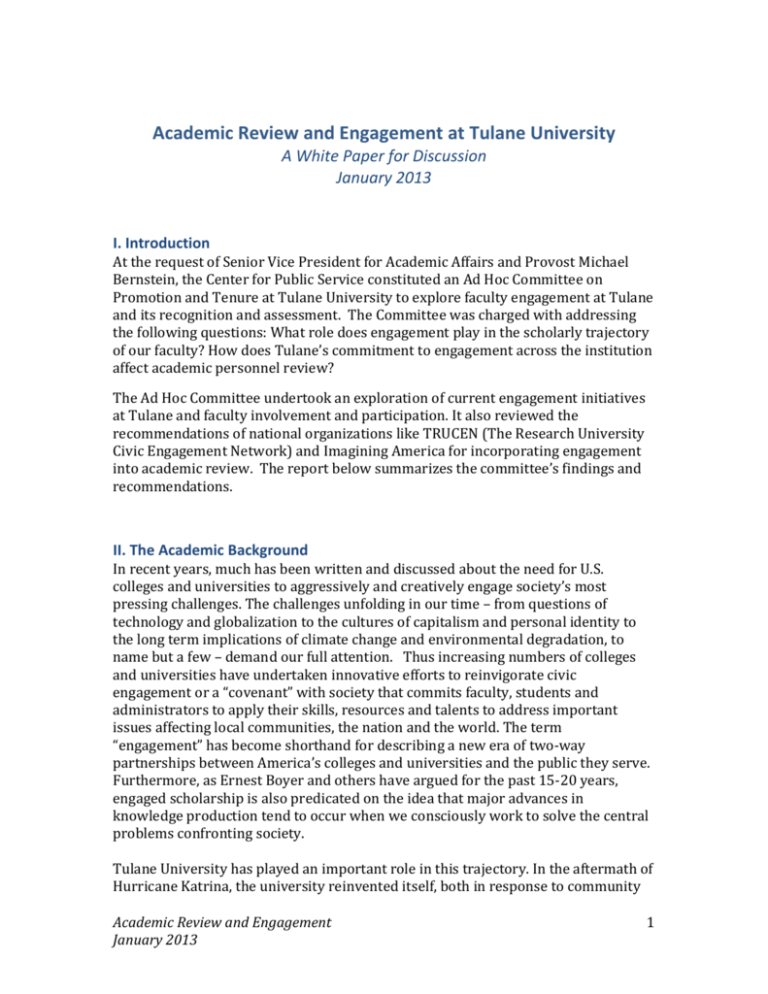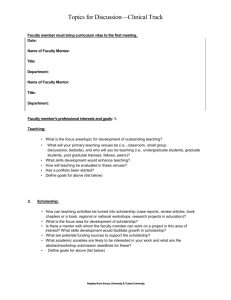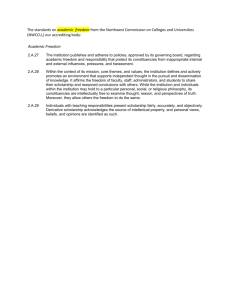Academic Review and Engagement at Tulane University
advertisement

Academic Review and Engagement at Tulane University A White Paper for Discussion January 2013 I. Introduction At the request of Senior Vice President for Academic Affairs and Provost Michael Bernstein, the Center for Public Service constituted an Ad Hoc Committee on Promotion and Tenure at Tulane University to explore faculty engagement at Tulane and its recognition and assessment. The Committee was charged with addressing the following questions: What role does engagement play in the scholarly trajectory of our faculty? How does Tulane’s commitment to engagement across the institution affect academic personnel review? The Ad Hoc Committee undertook an exploration of current engagement initiatives at Tulane and faculty involvement and participation. It also reviewed the recommendations of national organizations like TRUCEN (The Research University Civic Engagement Network) and Imagining America for incorporating engagement into academic review. The report below summarizes the committee’s findings and recommendations. II. The Academic Background In recent years, much has been written and discussed about the need for U.S. colleges and universities to aggressively and creatively engage society’s most pressing challenges. The challenges unfolding in our time – from questions of technology and globalization to the cultures of capitalism and personal identity to the long term implications of climate change and environmental degradation, to name but a few – demand our full attention. Thus increasing numbers of colleges and universities have undertaken innovative efforts to reinvigorate civic engagement or a “covenant” with society that commits faculty, students and administrators to apply their skills, resources and talents to address important issues affecting local communities, the nation and the world. The term “engagement” has become shorthand for describing a new era of two-way partnerships between America’s colleges and universities and the public they serve. Furthermore, as Ernest Boyer and others have argued for the past 15-20 years, engaged scholarship is also predicated on the idea that major advances in knowledge production tend to occur when we consciously work to solve the central problems confronting society. Tulane University has played an important role in this trajectory. In the aftermath of Hurricane Katrina, the university reinvented itself, both in response to community Academic Review and Engagement January 2013 1 needs and in order to survive, with a special emphasis on the creation of an undergraduate curricular public service requirement. Tulane’s journey to embedding engagement at the heart of a research university’s mission is unique, given its genesis in a catastrophic crisis, yet the lessons learned and outcomes achieved resonate across higher education in the 21st century. It is remarkable that in fall 2005, almost simultaneously with Tulane’s efforts to redefine itself as an engaged university, Campus Compact and the Jonathan M. Tisch College of Citizenship and Public Service at Tufts University convened scholars from research universities to discuss how their institutions were promoting engagement on their campuses and in their communities, and taking a leadership role in civic engagement. The Research University Civic Engagement Network (TRUCEN) emerged out of this meeting, and works to “advance civic engagement and engaged scholarship among research universities and to create resources and models for use across higher education” (Campus Compact, 2011). Tulane’s efforts represent a bold vision for civic and community engagement, and research conducted by the Center for Public Service with students, faculty members, and community partners corroborates the impact of embracing and advancing engaged scholarship as a central component of the university. Over the past seven years, Tulane has profoundly deepened its commitment throughout the university to public engagement. Beyond the growth and significance of the Center for Public Service and the public-service graduation requirement it administers, the recent establishment of the Center for Engaged Learning and Teaching (CELT) and the Tulane Empowers initiative continue to highlight the profound and permanent changes of the culture of the university. Today, the public face of the university is defined by engagement. As the university’s new web site proclaims, “Giving back to the community isn’t just a slogan at Tulane – it is part of our DNA.” Similarly, in preliminary strategic planning documents, a university identity is articulated that aligns the work of Tulane’s faculty and students with the needs, goals, and interests of the wider communities (local, regional, national and global) in which the University subsists.” Through this commitment and branding, we recruit new generations of undergraduates who choose Tulane because we’re committed to integrative public service and to engagement at every level. The university continues to build the necessary infrastructure for its engagement initiatives and our faculty must be key players in this process. Furthermore, like our students, new generations of faculty are likely to come to Tulane already committed to engagement and attracted by our institutional position. Given the centrality of engagement to Tulane’s mission and to the ongoing strategic planning process, we cannot continue to sustain a culture of academic review that is silent on engagement and seems to implicitly condone the view that only senior or non-tenure track faculty should be allowed or encouraged to do this kind of work. Academic Review and Engagement January 2013 2 As Syracuse university president Nancy Cantor argued a few years ago, [W]hile … engagement is flourishing, the graduate students and faculty members who are fueling the trend are not. As undergraduates, they were the first generation to have broad access to community-service learning programs in college. In graduate school, they want to remain engaged, and, ultimately, they hope to bring into the professoriate their commitment to that interdisciplinary type of scholarship. But scholars who want to collaborate with diverse groups off their campuses are still pressured to defer community-based research and civic collaborations until they receive tenure. How many times have we heard, "You'd better wait until you get tenure before you do that"? (Cantor and Lavine). III. The Challenge Because Tulane is recognized as a leader in public engagement as the only research university with a public service graduation requirement, we must maintain our leadership in this endeavor and develop a cogent and rigorous integration of faculty engagement in our academic-review processes. To recognize and reward faculty engagement is a significant next step if the university is going to achieve the ambitious and unprecedented agenda of Tulane Empowers “to set the standard for public service for the next generation of universities.” As we complete the seventh year since the announcement of our university’s historic undergraduate public service initiative, the time is ripe to do so. Most pointedly, we now must expand our understanding of the traditional review categories of research, teaching, and service to reflect achievements and successes in the area of public engagement. No one is suggesting that we supplant the traditional categories of academic review – research, teaching and service – with some wholly new criteria of public engagement. This is also not about adding another “tab” to the review dossier. Rather, it is about rethinking and expanding our notion of these traditional categories to encompass and explicitly recognize engagement, recognizing and rewarding the work and commitments of our faculty. It is important to underline that engagement activities are not meant to displace the traditional work of our faculty in research, teaching and service, but to enhance it. Tulane University must remain committed to longstanding traditions of scholarship and research while it also embraces evolving perspectives. Agreeing Upon Some Preliminary Definitions: Although there are many variants of these basic terms (and other, almost synonymous, terms like scholarship-in action and publicly engaged scholarship), the terms and definitions below serve to establish the legitimacy of engaged academic work and to provide a useful starting point for this conversation at Tulane. Engagement: " The partnership of university knowledge and resources with those of the public and private sectors to enrich scholarship, Academic Review and Engagement January 2013 3 research, and creative activity; enhance curriculum, teaching and learning; prepare educated, engaged citizens; strengthen democratic values and civic responsibility; address critical societal issues; and contribute to the public good" (Committee on Institutional Cooperation) Engaged Scholarship/Creative Activity: Engaged academic work is scholarly or creative activity integral to a faculty member’s academic area. It encompasses different forms of making knowledge about, for and with diverse publics and communities. Through a coherent, purposeful sequence of activities, it contributes to the public good and yields artifacts of public and intellectual value (Imagining America) Expanding Our Understanding of Research/Scholarship and Creative Accomplishment The faculty of Tulane University belong to scholarly and professional communities and are expected contribute to knowledge in these communities through research or creative work. The faculty is strong because they produce excellent scholarship/creative works within disciplines and interdisciplinarily, ranging from the purely theoretical to the applied. Typically, scholarship/creative activity is measured by peer recognition of its originality, impact on, and importance to the development of the field(s) or relevant disciplines and is demonstrated by refereed publications. It can also be demonstrated via the design and execution of research in laboratories or in the field, the presentation of papers at scholarly meetings, and external support (competitive fellowships and awards). In the creative or performing arts, faculty often combine scholarship with artistic accomplishment, demonstrated by dissemination of the artist’s work through performance, publication or exhibition in professionally recognized settings, As Andrew Furco has argued, engaged scholarship is articulated as a form of research and teaching that connects intellectual work to significant public issues. In engaged scholarship research is done with, rather than for or on a community – an important distinction. The research produces knowledge that is beneficial to the discipline as well as the community. Engagement creates a porous and interactive relationship between the academy and the community. The advantage to the community is that research draws upon community knowledge, reflects their concerns better, and ultimately yields a practical benefit. The benefit to the academy is that research agendas and methodologies are broadened to include critical questions that cannot be addressed without community engagement. (Furco, 10) Adapted from Furco’s work, the following table outlines the differences between traditional scholarship and engaged scholarship: Academic Review and Engagement January 2013 4 Traditional Scholarship Scholarship of Engagement Breaks new ground in the discipline Breaks new ground in the discipline and has a direct application to broader public issues Answers significant questions in the discipline Answers significant questions in the discipline, which have relevance to public or community issues Is reviewed and validated by qualified peers in the discipline Is reviewed and validated by qualified peers in the discipline and members of the community Applies appropriate investigative methods Applies appropriate investigative methods Is disseminated to appropriate audiences Is disseminated to appropriate audiences Makes significant advances in knowledge and understanding of the discipline Makes significant advances in knowledge and understanding of the discipline and the public interest Applies the knowledge to address social issues in the community Evaluating and Assessing Engaged Scholarship/Creative Activity All scholarship – be it traditional or engaged – must meet common expectations related to how the work is performed (identifying problems or topics, methodologies, and theoretical foundations), how it is legitimated (dissemination, assessment and recognition), its location in a scholarly/creative continuum, its quality, and its significance. Engagement in scholarship/creative activity will inevitably take different forms in Tulane’s various schools and disciplines. First of all, the language associated with outreach and engagement varies by discipline; that is, the ways of describing scholarly outreach and engagement are wide-ranging, including translational research, public humanities, civic engagement, university-community partnerships, etc. As they do with traditional scholarly/creative activity, the schools and disciplines should determine the criteria for evaluating the excellence of engaged scholarship. Tulane will remain committed to and supportive of longstanding scholarly traditions, while at the same time valuing and incorporating new integrative perspectives on scholarship, teaching and service committed to contributing more meaningfully and directly to public problems and issues at the local, national and international levels. In general, “all scholarly and creative achievements face the question of excellence. The judgment of excellence is arrived at dialogically and contextually, through cycles of evaluation that take place on campus and through a geographically dispersed community of peers – local, regional, national, transnational” (Ellison & Academic Review and Engagement January 2013 5 Eatman). The “excellence” of all scholarship/creative activity should be assessed on the basis of general attributes such as, clear goals, adequate preparation, appropriate methods, significant results, effective presentation, and reflective critique. IV. A Deliberative Process At this conjuncture, the conversation about recognizing and rewarding faculty engagement in research, teaching and service must be taken to the faculty and to the Promotion and Tenure committees of the schools. The Ad Hoc Committee recommends that the schools be charged with underlining the importance of engagement in research, teaching and service in their promotion and tenure criteria/guidelines. It also suggests that the following statement, (adapted from Imagining America’s “Scholarship in Public: Knowledge Creation and Tenure Policy in the Engaged University” could serve as a starting point for the discussion of how to incorporate engagement into academic review processes: Tulane University is committed to engagement across scholarship, research, creative activity, and teaching. Engagement lies at the core of the university’s mission and catalyzes the accomplishments of its faculty. Therefore, the university is committed to supporting traditional scholars as well as those scholars who participate in projects that advance community and other external partnerships, public engagement, and activities that similarly contribute to public discourse and the formation of robust politics. To this end, the committee suggests that the Senior Vice President for Academic Affairs and Provost distribute this white paper to Deans and the members of schoolbased academic review committees for preliminary discussions. Subsequently, the committee also suggests that he convene a special faculty town-hall meeting in which to discuss these issues and to obtain direct feedback from a larger faculty constituency. Academic Review and Engagement January 2013 6 References Cantor, Nancy and Lavine, Steven (2006) “Taking Public Scholarship Seriously, The Chronicle of Higher Education, June 6. chronicle.com/article/Taking-PublicScholarship/22684/ Committee on Institutional Cooperation (Committee on Engagement in collaboration with National Association of State Universities and Land Grant Colleges: Council on Extension, Continuing Education, and Public Service Benchmarking Task Force). (2005) "CIC Reports. Draft Resource Guide and Recommendations for Defining and Benchmarking Engagement." Committee on Institutional Cooperation. Champaign, IL. http://www.cic.uiuc.edu Diamond, Robert. “Tenure and Promotion: The Next Iteration,” The National Academy for Academic Leadership, http://www.thenationalacademy.org/readings/tenpromo.html Ellison, Julie and Eatman, Timothy (2008) “Scholarship in Public: Knowledge Creation and Tenure Policy in the Engaged University.” Imagining America. Furco, Andy (2005) “Promoting Civic Engagement at the University of California,” Center for Studies in Higher Education, UC, Berkeley. cshe.berkeley.edu/publications/docs/StrategyReport.2.06.pdf Ad Hoc Committee on Academic Review and Engagement (alphabetically) Michael Cunningham, Psychology/CELT T.R. Johnson, English Jordan Karubian, Ecology and Evolutionary Biology Nghana Lewis, English Ana López, Communication/Provost’s Office Susann Lusnia (Classics) Beretta Shomade-Smith, Communication Facilitated by Agnieszka Nance and Vincent Ilustre (Center for Public Service) Academic Review and Engagement January 2013 7







